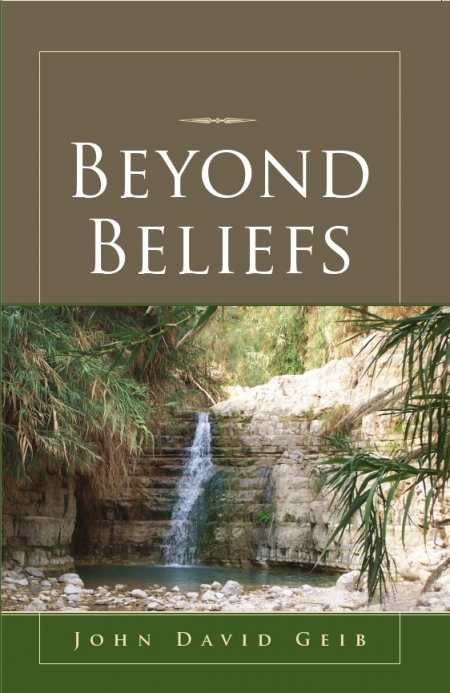
Beyond Beliefs
A Christian philosopher mixes logic and faith to produce his own map to God as an experience and not merely an idea.
John David Geib, a proponent of Christian philosophy, believes that to get “beyond beliefs” one has to accept God as a person, not a “program,” and pursue “being” rather than rely on “words about being.” Geib, who holds numerous degrees from American religious institutions, bases the conclusions in his new book, Beyond Beliefs, largely on his own conversion experience.
Geib came to Christianity after a typical postmodern lifestyle in his youth, navigating without a compass through such perilous waters as the drug subculture. He draws interesting correlations between the twentieth-century discovery of LSD-25 (mental explosion) and the use of uranium for productive and destructive purposes (physical explosion). The atomic bomb took away his generation’s sense of security; psychedelic drugs made the physical world seem unreal. Accordingly, many modern people are at an impasse, casting about for solid foundation. At a certain point, Geib himself lacked any religious faith.
Through Geib’s studies of Christianity, he developed a “map,” as he calls it, of abiding truth. One fact seemed clear to him from the beginning: “humans in their own power” would find it almost impossible to follow Jesus’ basic instruction to love their neighbors as themselves. Only through direct experience of Jesus could anyone be transformed, “not by pondering words, but by experiencing The Word.”
After Jesus was gone, that word continued to enliven his followers through the grace of the Holy Spirit, Geib says. The author examines the difference between secondary or tertiary verbal expressions such as theology, ideology, dogma, and doctrine, and real, primary experience. He concludes that Jesus, God’s emissary, can transform humans into primary witnesses, raising them from spiritual death to spiritual union through his power and peace.
After a lengthy introduction regarding the impasse described above, touching peripherally on his personal perceptions, Geib launches into a chronology based on the development of Christianity and other concomitant philosophies, through current day. This material contains some useful tables: one compares Old Testament teachings with the covenants of Jesus; another analyzes words used by the apostles to describe their living experience of the spirit of God; and one contrasts two great world teachers, Jesus and Socrates. Competently composed, Beyond Beliefs has copious endnotes, its primary reference being the Holy Bible, and the book also includes quotations from such divergent sources as Bob Dylan’s “Mr. Tambourine Man” and the 1964 film “Dr. Strangelove.”
However, this neatly organized treatise has one notable flaw. Those whom the author would doubtless like to reach with his logical examination of spiritual matters, that is, intellectually guided people outside organized religion, will be put off by the constant, irrelevant capitalization of almost any word that strikes him as important. Consider the following examples: Our Present Time, Reality, Historical Fact, Human Psychology, The One Truth about Life, and Humanity. This chronic tendency weakens the author’s stance, making the text look considerably less than erudite.
Logic and faith are a potent mix. Geib has stirred them together with equal parts. With this book, he may garner a following for the experientially based Christian practice he espouses.
Reviewed by
Barbara Bamberger Scott
Disclosure: This article is not an endorsement, but a review. The publisher of this book provided free copies of the book and paid a small fee to have their book reviewed by a professional reviewer. Foreword Reviews and Clarion Reviews make no guarantee that the publisher will receive a positive review. Foreword Magazine, Inc. is disclosing this in accordance with the Federal Trade Commission’s 16 CFR, Part 255.
